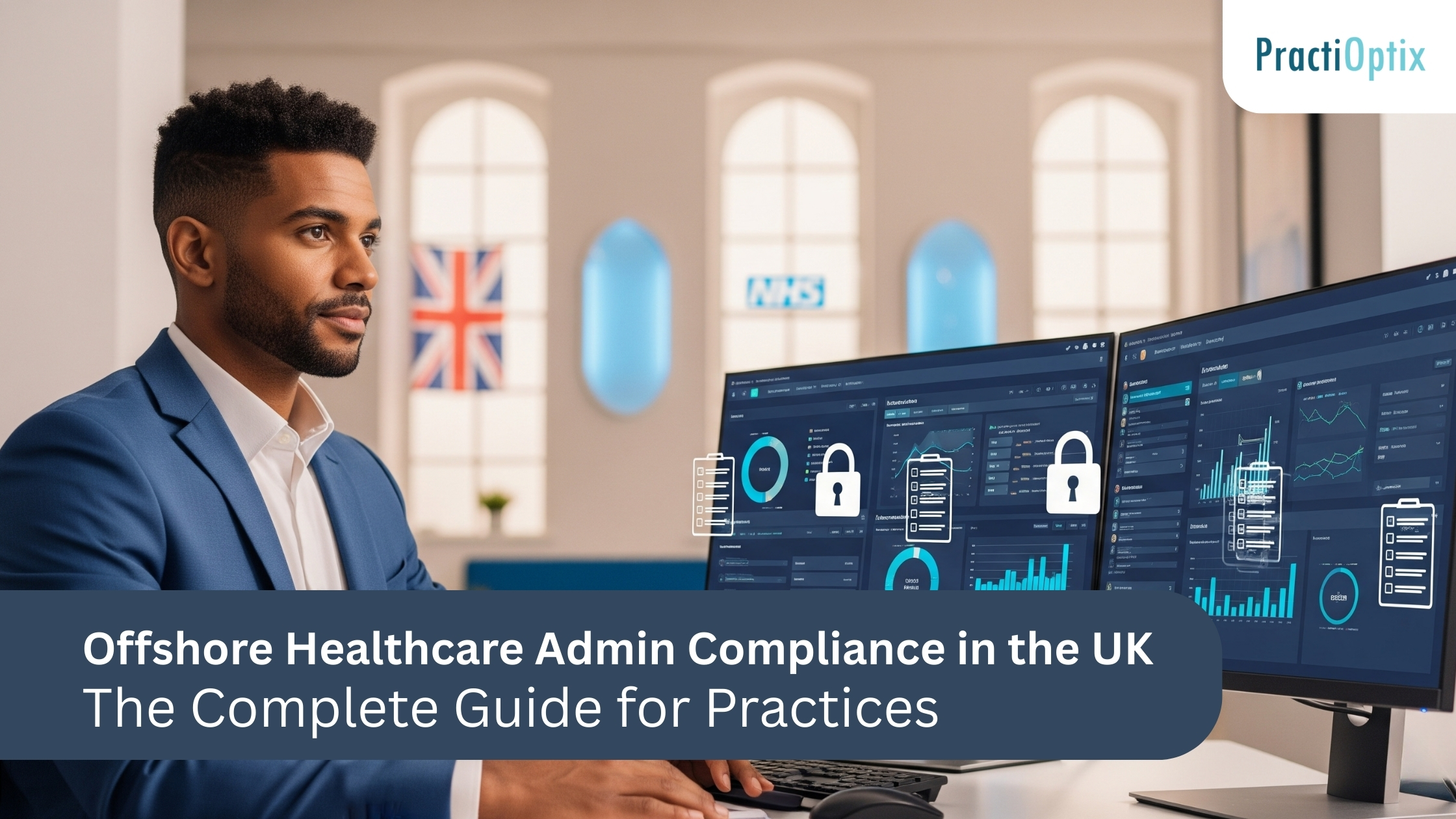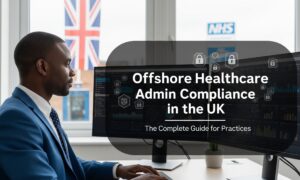
Offshore Healthcare Admin Compliance in the UK: The Best Guide for Practices In 2025
A PractiOptix deep-dive on Offshore Healthcare Admin Compliance in the UK—staying compliant while unlocking efficiency, flexibility, and growth.
In today’s dynamic UK healthcare landscape, administrative efficiency has become a strategic priority for both NHS and private practices. Offshore healthcare administration can reduce costs, extend service hours, and bring in specialised expertise across billing, scheduling, records management, and claims processing. Yet one truth stands above all: without airtight compliance, none of those advantages are sustainable. This guide explains how UK clinics can confidently leverage offshore admin support while protecting patient data, meeting regulatory duties, and building long-term patient trust.
Why UK Practices Are Turning to Offshore Admin
- Persistent staff shortages and cost pressures across NHS and private sectors.
- Rising patient expectations for faster responses, clear communication, and digital-first experiences.
- The push for transformation—moving from fragmented manual processes to integrated, technology-enabled operations.
When implemented well, offshore support can deliver up to 60% reductions in operational costs, faster turnaround on routine tasks, and consistent access to specialist skills. Practices also benefit from extended service windows for appointment queries, payment follow-ups, and reminders—without overburdening in-house teams.
The Compliance Imperative
Compliance is not optional; it is the foundation of safe offshore administration. UK healthcare regulations are strict and fast-evolving, and breaches can erode patient confidence, attract penalties, and damage reputation. The good news: with the right controls, contracts, and culture, offshore models can be as secure and auditable as in-house processes.
Essential Compliance Frameworks
1) UK GDPR & Data Security
The UK GDPR is central to handling patient data in any context—onshore or offshore. Key principles include lawfulness, fairness, transparency, data minimisation, accuracy, storage limitation, integrity/confidentiality, and accountability. In practice, that means:
- Explicit consent or a valid lawful basis for all processing involving personal and special category data (including health data).
- Encryption in transit and at rest, enforced access controls (MFA, role-based permissions), and least-privilege principles.
- Comprehensive documentation: Records of Processing Activities (ROPA), Data Protection Impact Assessments (DPIAs), and retention/disposal schedules.
- Clear international transfer safeguards, such as International Data Transfer Agreements (IDTAs) or Standard Contractual Clauses (SCCs) where applicable.
- Timely breach management with defined incident response and notification pathways.
2) NHS & CQC Standards
The NHS and the Care Quality Commission (CQC) establish rigorous expectations for clinical governance and administrative processes. Offshored tasks remain subject to the same standards for accuracy, confidentiality, data retention, and audit readiness. Practical implications include:
- Alignment with NHS protocols for claims and billing, including validation steps and error resolution.
- Periodic internal reviews and staff training on confidentiality, safeguarding, and information governance.
- Evidence of quality assurance—checklists, sample audits, error-rate tracking, corrective actions, and root-cause analysis.
3) Duty of Care & Clinical Governance
A clinic’s duty of care extends to the actions of its offshore partners. Governance frameworks must define who is accountable for what, and how issues are identified and resolved. Look for:
- Clear supervision and escalation paths from offshore admin teams to UK leads.
- Service level definitions (accuracy, timeliness, first-contact resolution) tied to audit trails.
- Routine spot checks and calibration sessions to prevent drift from approved procedures.
4) Sector-Specific Acts & Regulations
Offshore operations should be held to the same standards as local teams with respect to health and safety, documentation, and emergency readiness. While administrative tasks are not clinical procedures, maintaining robust workplace policies, training records, and incident documentation supports an overall culture of compliance and resilience.
How to Implement Offshore Admin Safely: Best Practices
1) Vet and Select Qualified Partners
- Healthcare pedigree: Demonstrated experience with UK billing, coding, scheduling, and claims requirements.
- Compliance maturity: GDPR training, information governance certification, ISO 27001 or comparable controls, and familiarity with CQC expectations.
- Transparent documentation: Sample policies for data protection, retention, redaction, and breach handling available for review.
- Security posture: Access management, endpoint protection, secure VPNs, device hardening, and logging/monitoring tooling.
2) Build Robust Data Protection & Privacy Protocols
Treat every data flow as a mapped, controlled, and monitored pipeline. Essential controls include:
- End-to-end encryption; secure file transfer and document management.
- Data minimisation and pseudonymisation where possible; clear redaction standards.
- Retention limits with automated disposal and verifiable destruction logs.
- Multi-factor authentication, device compliance checks, and IP allow-listing for remote access.
- DPIAs for new workflows and documented outcomes, risks, and mitigations.
3) Operational Transparency & SLAs
SLAs are your legal and operational backbone. Define what “good” looks like and how it is measured:
- Metrics for billing accuracy, denial rates, turnaround times, appointment response times, and documentation completeness.
- Incident response definitions, escalation thresholds, and response/resolution timeframes.
- Monthly compliance reports, sample quality audits, and continuous improvement actions.
4) Supervision, Review & Ongoing Training
- Regular joint review calls to discuss errors, near misses, and process updates.
- Quarterly compliance workshops delivered by UK regulatory specialists.
- Role-based training paths for new hires and refresher tracks for tenured staff.
5) Strengthen the Tech Stack
Technology choices should reduce risk and improve visibility:
- Audit-ready, access-controlled practice management and billing platforms.
- Centralised identity and access management with automatic de-provisioning.
- Immutable logs and monitoring to detect anomalous access or data exfiltration.
- Automated workflow rules to enforce mandatory checks before submission.
6) Contracts, DPAs & International Transfers
Convert compliance into binding commitments. Ensure your contracts include:
- Data Processing Agreement (DPA) with detailed processing purposes, categories, and retention.
- Approved transfer mechanisms (e.g., UK IDTA/SCCs) and sub-processor controls.
- Right to audit, cooperation on Subject Access Requests, and breach notification timelines.
- Clear termination/exit plans covering data return or deletion and knowledge transfer.
7) Business Continuity & Resilience
Patients should not feel the impact of disruptions. Look for:
- Geographic redundancy, power and connectivity failover, and regular DR testing.
- Playbooks for surge events, cyber incidents, and natural disasters.
- Clear RTO/RPO targets aligned to clinical risk tolerance.
Step-by-Step Adoption Plan
- Define scope and success metrics: Select low-risk workflows first (e.g., reminder calls, appointment confirmations, routine billing follow-ups).
- Run a DPIA: Map data flows, identify risks, and document mitigations.
- Contract & onboarding: Execute the DPA, confirm transfer safeguards, and provision role-based, time-bound access.
- Pilot phase: Begin with a subset of patients or a single location; measure accuracy, turnaround, and patient feedback.
- Calibrate & train: Use early findings to refine SOPs, templates, and checklists; schedule refresher sessions.
- Scale gradually: Expand to more complex tasks once quality and compliance thresholds are consistently met.
- Review quarterly: Hold governance reviews, refresh risk registers, and update controls for new regulations or system changes.
Common Pitfalls to Avoid
- Assuming the vendor “has it covered”: Responsibility remains with the UK controller; verify controls and evidence.
- Over-sharing data: Send only what is necessary; remove identifiers when feasible.
- Weak access revocation: Orphaned accounts and shared credentials are a major risk.
- Poor documentation: If it isn’t written and auditable, it didn’t happen.
- Skipping patient communication: Be transparent about how data is processed and protected.
A Quick Compliance Checklist
- Lawful basis identified; consent captured where required.
- DPIA completed with actions tracked to closure.
- DPA executed; international transfer safeguards in place.
- Role-based access, MFA, device compliance, and VPN enforced.
- Retention schedules, secure disposal, and destruction logs active.
- Audit trails, quality sampling, and monthly compliance reporting.
- Patient privacy notices updated; SAR and deletion request processes tested.
- Business continuity and incident response playbooks tested.
UK Healthcare Data Privacy: How PractiOptix Ensures Compliance
Data privacy is one of the most critical aspects of healthcare administration in the UK. With strict regulations under UK GDPR and the Data Protection Act 2018, clinics must safeguard sensitive patient records at every step—whether billing, scheduling, or records management is handled locally or offshore.
For practices exploring offshore support, the challenge lies in maintaining UK healthcare data privacy without compromising efficiency. This involves ensuring encrypted communication, secure data transfer, consent-based processing, and full audit trails.
At PractiOptix, we make this seamless. Our offshore admin teams are fully trained on UK data protection laws and implement robust safeguards, including end-to-end encryption for all patient interactions, GDPR-compliant data handling protocols, confidentiality agreements for every staff member, and regular privacy audits and compliance reviews.
By combining deep domain expertise with rigorous data privacy frameworks, PractiOptix enables practices to unlock offshore efficiency while staying fully compliant with UK healthcare data privacy standards.





Leave a Reply